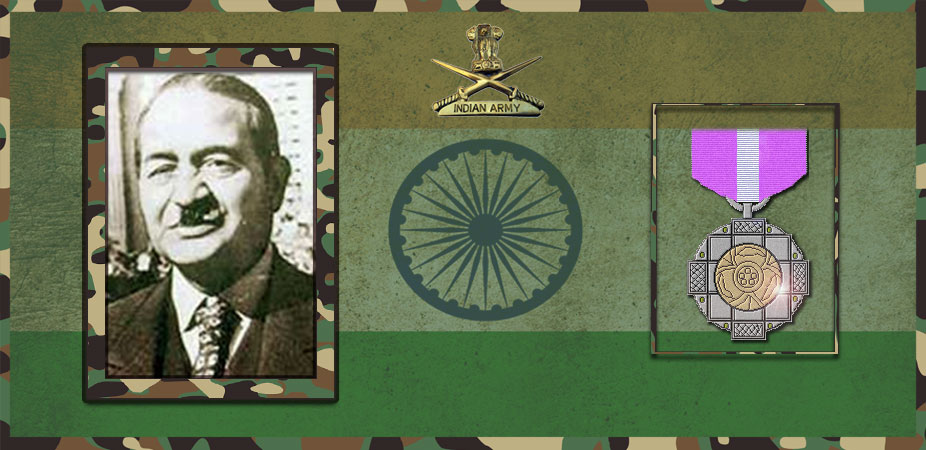Let's salute to our Indian Army together, We are proud to be Indian.
Let's salute to our Indian Army together, We are proud to be Indian.

Sir Shanti Swaroop Bhatnagar OBE, FRS (21 February 1894 – 1 January 1955) was a well-known Indian scientist, a professor of chemistry for over 19 years. He was the first director-general of the Council of Scientific and Industrial Research (CSIR), and he is revered as the “father of research laboratories”.He was also the first Chairman of the University Grants Commission (UGC).
To honour his name and achievements, CSIR instituted an award Shanti Swarup Bhatnagar Prize for Science and Technology, since 1958 for outstanding scientists who made significant contributions in various branches of science.
Bhatnagar was born in Bhera, Punjab region of British India, in a Hindu kayastha family. His father, Parmeshwari Sahai Bhatnagar, died when he was eight months old and he spent his childhood in the house of his maternal grandfather, an engineer, from whom he developed a liking for science and engineering. He used to enjoy building mechanical toys, electronic batteries, string telephones. From his maternal family he also inherited a gift of poetry. He studied elementary education at the Dayanand Anglo-Vedic High School, Sikandrabad (Bulandshahr). In 1911 he joined the newly established Dayal Singh College, Lahore, where he became an active member of the Saraswati Stage Society. Bhatnagar earned a good reputation as an actor. He wrote a Urdu one-act play called Karamati (Wonder worker), the English translation of which earned him the prize and medal of the Saraswati Stage Society for the best play of the year 1912. Bhatnagar passed the Intermediate Examination of the Punjab University in 1913 in first class, and joined the Forman Christian College from where he obtained BSc with major in physics in 1916, and MSc in chemistry in 1919.
Bhatnagar was awarded a scholarship by the Dyal Singh College Trust to study abroad. Therefore, he left for America via England. But as luck would have it, in England he could not find a berth on ships as they were all reserved for American troops who were then being demobilised due to the First World War. The Trustee permitted him to join the University College London under chemistry professor Frederick G. Donnan. He earned his DSc in 1921. While in London, he was additionally supported by the British Department of Scientific and Industrial Research with fellowship of £250 a year. In August 1921 he returned to India and immediately joined the newly established Banaras Hindu University (BHU) as a professor of chemistry, where he remained for three years. He wrote the ‘Kulgeet’ (University song). Justice N.H. Bhagwati, Vice-Chancellor of BHU said: “Many of you perhaps do not know that besides being an eminent scientist, Professor Bhatnagar was a Hindi poet of repute and that during his stay in Banaras, he composed the ‘Kulgeet’ of the University Prof. Bhatnagar is remembered with reverence in this University and will continue to be so remembered till this University exists. “He moved to Lahore as Professor of Physical Chemistry and Director of University Chemical Laboratories of the University of the Punjab. This career was the most active period of his life in original scientific work. His research interests included emulsions, colloids, and industrial chemistry, but his fundamental contributions were in the field of magneto-chemistry, the use of magnetism for the study of chemical reactions. In 1928 he and K.N. Mathur jointly invented what they called the Bhatnagar-Mathur Magnetic Interference Balance, which was one of the most sensitive instruments for measuring magnetic properties. It was exhibited at the Royal Society Soiree in 1931 and it was marketed by Messers Adam Hilger and Co, London.
For his excellent contributions to pure and applied chemistry, Bhatnagar was appointed an Officer of the Order of the British Empire(OBE) in the 1936 New Year Honours List. He was knighted in the 1941 New Year Honours List for his contributions to the advancement of science. In 1943 the Society of Chemical Industry, London, elected him as Honorary Member and later as Vice President.Bhatnagar was elected a Fellow of the Royal Society (FRS) in 1943.
In independent India, he was the President of the Indian Chemical Society, National Institute of Sciences of India and the Indian National Science Congress. He was awarded Padma Bhushan by the government of India in 1954.
The prestigious award in science in India, Shanti Swarup Bhatnagar Prize for Science and Technology was created in his honour.